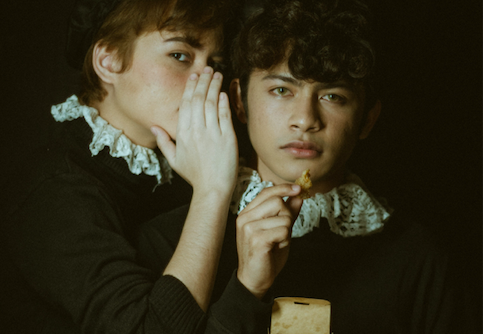When COVID hit us all, people found different ways to handle their stress during these turbulent times.
Some baked, others ate or drank or overexercised or spent 90 percent of their time glued to Netflix. I read social media posts and heard friends and family question people’s survival instincts and choices. Based on their own belief system, people decided what was normal, what was acceptable, and what was not.
On the contrary, I found myself saying the same thing to everyone, “To each their own. We are all coping, so let people be.”
I felt really proud of myself for intentionally freeing up my heart and mind by not criticizing anyone or holding negative opinions around how anyone chose to navigate these unprecedented times. It’s taken me years to get to this place of feeling so good about myself that what others do or don’t do doesn’t feel like a reflection of my own perceived deficiency. It’s nice to look back and see how far I have come.
Despite our best efforts, most of us judge others.
Growing up in a South Asian family, from the time you are a kid, you hear comparisons and unnecessary judgment at every occasion: family gatherings, funerals, weddings, weekend parties—well, you get the picture. Being judgmental in the diaspora is as natural as middle-aged uncles doing drunk dancing with their pot bellies hanging out. Be it people’s food, body shape and size, skin color, life, career, skills, personal choices, and other appearances—unfiltered and unwarranted opinions are galore.
My cousin, Dr. Jyotika Agochiya, was often teased by her friends in medical school, “What’s the point in hanging out with you if you aren’t going to gossip about anyone?”
I love the flavors of South Asian spices and the wisdom of Ayurveda and yoga. By the same token, I cringe at how easily we demean and diminish “the other.” Despite all the global impact, modernism, and progress in South Asia, if a woman can’t cook, people raise eyebrows. Getting a degree and a job is something she is expected to do aside from serving fresh meals to her family. If a person chooses to remain single, the assumption is that there must be something “wrong” with them. If someone doesn’t have children, the underlying assumption is infertility and sadness instead of ever wondering that it could be a personal choice. If a couple gets divorced, the basic belief is that the woman must lack something.
When I met my husband, I realized that he never had anything bad to say about anyone. He always chose to give others the benefit of the doubt and maintained that we don’t know where people come from so we should have compassion. Initially, I thought this was a weird habit—remember, I grew up believing judging others was a natural instinct? Him not criticizing others made me feel lesser than, perhaps? When he said, “What makes us so perfect that we can pass comments on others? Have you put yourself in their shoes?” I paused. There was merit in this kind of empathetic thinking that hadn’t occurred to me before.
When I started my yoga journey 15 years ago, I started to see what my husband meant. Yoga teaches you to pause, reflect, pay attention, turn inward, and become mindful. In case you are wondering, yoga is not just about just being bendy on the mat; it’s about extending that mental flexibility even off the mat.
Yoga taught me that we might judge others when we either think we are better than them (hello, perceived complexes!), or when we are struggling ourselves but putting up a brave façade. Sometimes we judge because we have been trained to not be curious about unfamiliar spaces or choices. Sometimes we judge because that’s the only way we know to process anything outside of our belief system. Sometimes we judge someone for something that we do ourselves or have done and are deflecting emotions. Sometimes we judge because we are afraid, insecure, hide contempt, and feel threatened.
I am quite aware that I am not like the majority of South Asian women who were born and raised in the old country. When I was younger, I tried hard to be like the others; as I got older, I got really comfortable with who I am and started to pour my energy into finding my tribe. I am grateful that I couldn’t be defined or that I didn’t fit in a box because that’s helped me create deep and meaningful relationships with friends and family who really matter to me. I don’t do fluff.
Jyothika is one of those safe people in my life who meets me where I am and reminds me what confident, nonjudgmental, and caring women look like.
Another person whom I have known to not judge is a very dear friend, Shuchi Sethi. She said, “I have to say it was really a collective of experiences that changed my perspective on making judgments on people. We don’t know what demons anyone is fighting or what their internal compulsions are. As I grow older, I have seen so many people in my family who look like ‘they have it all’ but are falling apart inside to hold it all together. I have seen mental health struggles, including family members who have taken their own lives. All of us projecting our perfect lives on social media doesn’t help either.”
Everyone has their own choices and challenges. What gives us the authority to point out what we think of others? I can promise you, the day I stopped judging others, my life changed. My sleep and breathing became deeper. I started to experience the world differently. I saw people through a different lens. I got rid of the fluff and noise and made meaningful friendships.
Honestly, when you stop judging others, you build a beautiful world for yourself. It’s a heart-warming feeling creating safe spaces for others and uplifting them. Our friends and family know that they can talk to us about what they’re going through and ask for the help they need.
Ask yourself: do you judge others and what triggers this process? Is there anything you can do to stop this attitude?
It takes intentional efforts to pause and notice this self-sabotaging behavior. It requires mindfulness to acknowledge when we trip and fall into old patterns. Whenever that happens, I take a step back and ask myself what brought upon this feeling. Oftentimes, we judge others in the areas where we feel we are the weakest. Think about it.
~
“When you judge others, you do not define them, you define yourself.” ~ Earl Nightingale
~









Read 0 comments and reply